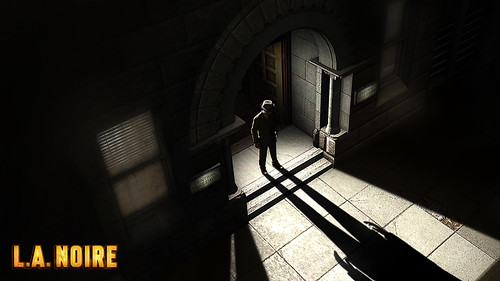Warning: This post contains spoilers for the game L.A. Noire!

LA Noire Screenshot 4 by The GameWay
Since my husband and I have been working through L.A. Noire lately (which I love!), I've been thinking about how linear the story has been (especially for an interactive video game).
The story is the best feature of the game in my opinion. I can't really remember any game I've played that has had a story that is so effective. I suppose Final Fantasy VII would have come the closest given how surprised and upset I was that they killed Aeris by the end of the first disc. (Disclaimer: I haven't actually played a huge number of games. I bet there are lots of counter examples to my claims, and I'd love to hear about them in the comments.)
In L.A. Noire, I'm really drawn to the character development and the gradual insights you get into the victims of crimes and the detectives themselves. I find some of the characters vile at first, such as your homicide partner Rusty Galloway, a womanizer and apparently lazy sod. But then they grow on me — through little tidbits of conversation, you start to see why they are the way they are. Most video game characters I've encountered haven't been that complex.
The game definitely feels like a game, yet when you really stop to think about it, the plot is really quite linear. There isn't a lot you can do to change the outcome of the story. When we were given the opportunity to decide who to charge with murder in a couple of cases, it wasn't even clear to me whether we were supposed to know whether we were right or wrong. That made me suspect there was no right answer, which was later confirmed by finally catching the real killer for all the murder cases we worked on. Other than that, the only real story-related choice is how you interrogate suspects, but it appears that only new information will come to light if you get it right, while the main plot remains the same.
The Way of the Game describes L.A. Noire this way:
Police procedurals aren’t about gunfights, car chases and explosions. They are slow, methodical vehicles for telling a story about a crime, who committed it and the people who figured it out. In L.A. Noire, you’ll get to learn more about Phelps, his history and what he does when he’s not busy being the one good cop in a city full of sinners. You’ll learn more about his partners and their views of good, evil, and the gray area in between. L.A. Noire’s story is slow to develop, but every new episode gets you deeper and deeper.With such a great, yet linear, story, the question remains: does it matter? If the game is engaging and enjoyable, probably not, but it does make you wonder when we'll be able to have truly great non-linear stories in games.

2 comments:
Some of the most enjoyable games in terms of its story were heavily linear. I think games need to be somewhat linear for the story to really come together.
Games that are very free flowing and loosely attached to a story are not as enjoyable IMHO. The story feels like a really bad tacked on type of thing rather than integrated with the game.
I have to say, a girl geek that plays games = coolness++;
=)
I know lots of girl gamers - but I have to admit I often prefer to watch. ;)
Now, about your comment on linearity. I agree that this is true right now, but I don't think it will always be true. I think we're still working on the problem and will hopefully find good ways to make interesting stories that aren't so linear. That doesn't mean they have to be totally open ended - just that players can make more meaningful choices that change the outcome of the narrative. This is likely going to be one of the main areas of my PhD research. ;)
Post a Comment
Comments are moderated - please be patient while I approve yours.
Note: Only a member of this blog may post a comment.